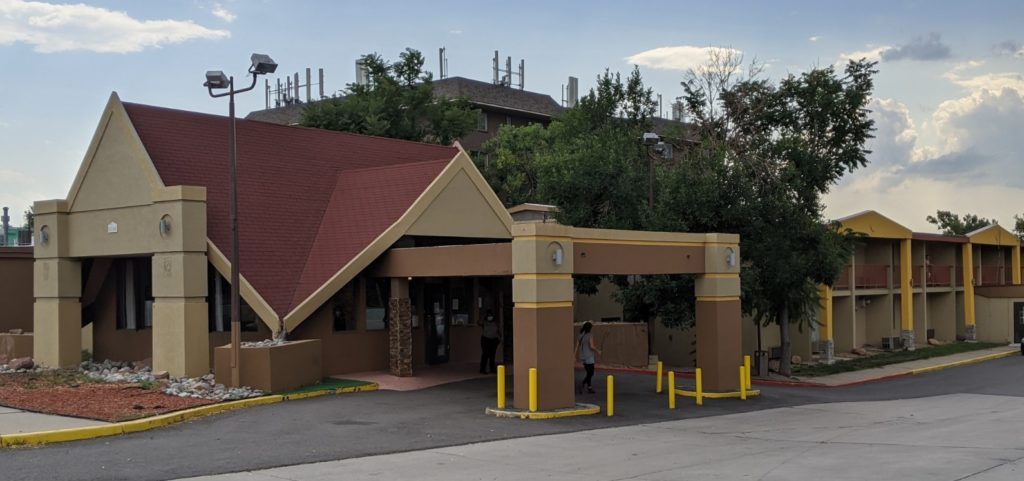The Rodeway Inn, a motel at I-70 and Federal, has new residents. Denver Housing Authority (DHA) purchased the motel and is repurposing it as housing for Denverites experiencing homelessness. Stella Madrid, Intergovernmental & Community Affairs Officer for DHA, said they are starting a comprehensive process needed to potentially use the site for permanent supportive housing and DHA selected the location in part because of its access to transit, neighborhood services, and of course price and availability. She hopes the site can have around 200 units. Their planning is expected to take at least two years.

Photo by David Sabados
While they’re creating their plans, the site is being run by the Denver Department of Housing Stability (HOST) as a shelter for women.
“The pandemic really shattered our shelter system,” explained James Ginsburg, Deputy Director of HOST. As the city has struggled to find housing for an increasing homeless population, other locations like the National Western Complex and Denver Coliseum have been used as mass shelters.
Ginsburg explained they saw the motel as an opportunity to give women their own rooms. Many work, or are looking for work, and the stability of a safe place to return to each night can help them transition to permanent housing.
Councilwoman Amanda Sandoval, who represents the area, supports the motel’s conversion, noting that there were frequent emergency services calls to the motel when it was privately owned and referred to a previous owner as a “bad actor” in the neighborhood. “I think it’s a good interim solution,” Sandoval said of the site housing women experiencing homelessness, adding that she hopes to see more wraparound services. Ginsburg said they are working with Catholic Charities and others and expanding services provided.
The City of Denver is also currently exploring the possibility of sanctioned outdoor camping locations for the homeless as well, referred to as “safe outdoor sites.” While initially opposed to the idea, the Hancock administration asked council members who signed a letter of support to suggest locations in their districts. At the same time, the city was moving ahead with a plan to use the Denver Coliseum’s parking lot and outdoor areas. That idea has now been put on the backburner after Councilwomen Candi CdeBaca (who represents the area) Debbie Ortega (who serves at-large) both spoke out strongly against the measure.
CdeBaca, who has been an outspoken critic of the police sweeps disbanding downtown homeless camps and supportive of previous efforts in her district to find housing for people experiencing homelessness, released a statement calling for the administration to look at locations in other parts of the city as well.
“We will work with any situation because of the urgency of the need, but we hope to see a site in every district within the next month,” CdeBaca said in a statement. “We cannot continue to concentrate inequities in a single neighborhood or district just because it is the most politically convenient option.”
Councilmembers and community members opposed to the Coliseum location have said that the area had become a dumping ground for the city and that projects shouldn’t be concentrated in only a few areas. The Globeville and Elyria-Swansea neighborhoods that surround the Coliseum are some of Denver’s poorest.
In Northwest Denver, Councilwoman Sandoval also expressed frustration with the process. “I signed onto a letter in April,” explained Sandoval. “The mayor didn’t respond until July.” That response was to ask members who support outdoor sites for locations in their districts that met specific size and facility requirements.
“It’s not equitable that the mayor only asked council members who signed on,” said Sandoval, hoping to see suggestions for sites in every neighborhood instead.
Sandoval said she did extensive outreach to the community asking for suggestions and, based on that feedback, sent two ideas to the mayor’s office: the parking lot for the Riverside Baptist Church, and a parking lot near the Downtown Aquarium.
As was first reported by Thomas Gounley in the online Denver-based news outlet BusinessDen.com, “Hancock spokesman Mike Strott said council members didn’t necessarily contact property owners before suggesting the sites. He said the administration is reviewing them on a number of factors, including ‘legality; neighborhood impact; equity; flooding potential; access to services, utilities and transportation; size; and cost.’”
A woman answering the phone at Riverside Baptist told The Denver North Star that “the church was never approached and has not been approached” about the idea, but church leadership declined to comment further. Katelyn Roche Gosslee of Dancie Perugini Ware Public Relations, a spokesperson for Landy’s Downtown Aquarium (who owns the second parking lot suggested) emailed The Denver North Star to confirm she was the company’s media contact, but then did not respond to multiple requests for comment regarding the company’s knowledge of the recommendation or their interest in hosting a camp location.
While Sandoval said she’s open to discussing changes to the camping ban and outdoor locations, she believes the city should be focused more on Social Impact Bonds (SIB), where private lenders loan funds for a specific purpose, such as housing for people experiencing homelessness. Last November, the city released a report saying of the 330 people helped into housing through SIB programs, 79% were still housed. Colorado Coalition for the Homeless and several other organizations focused on addressing homelessness called the program a success.

Do you know if they have made any progress on this?